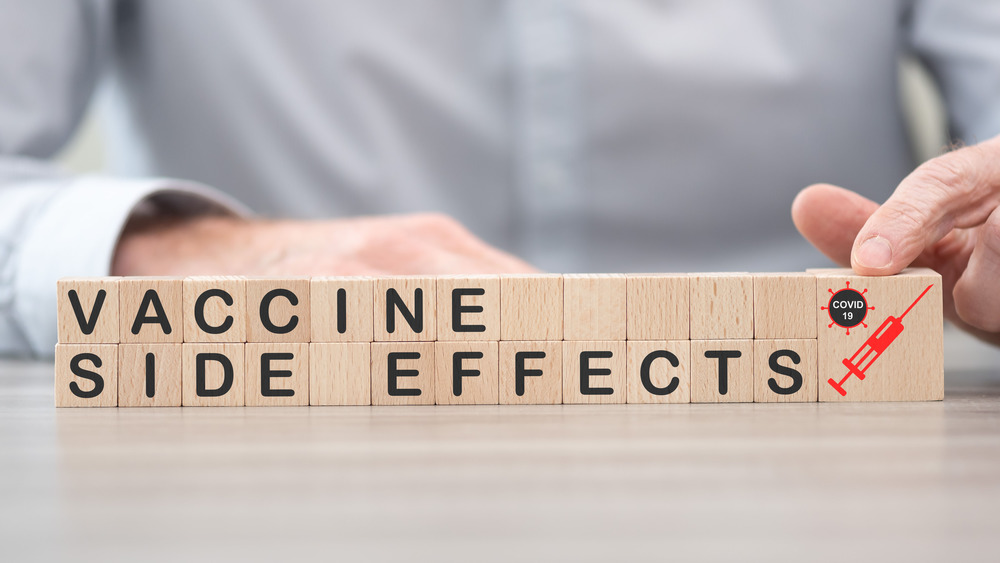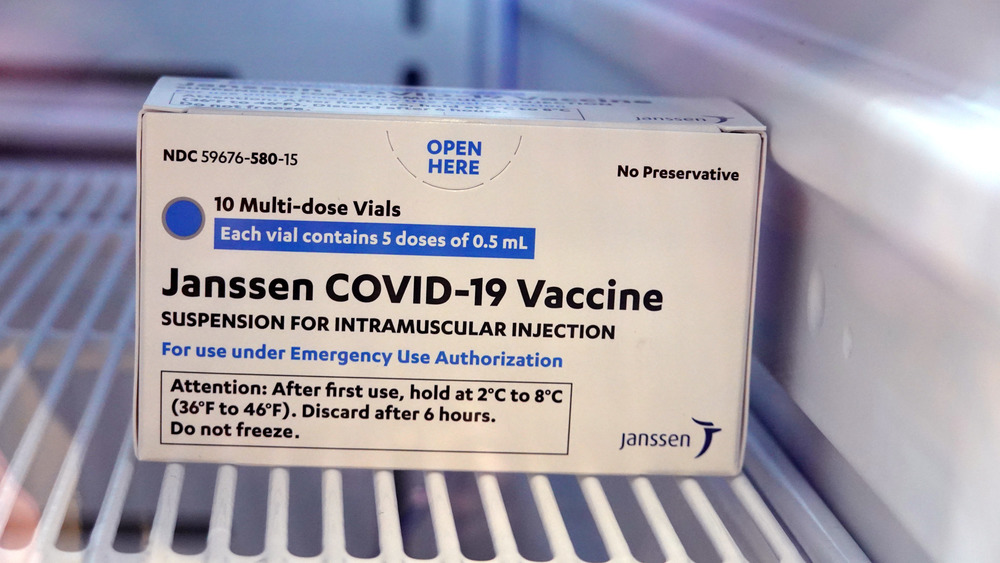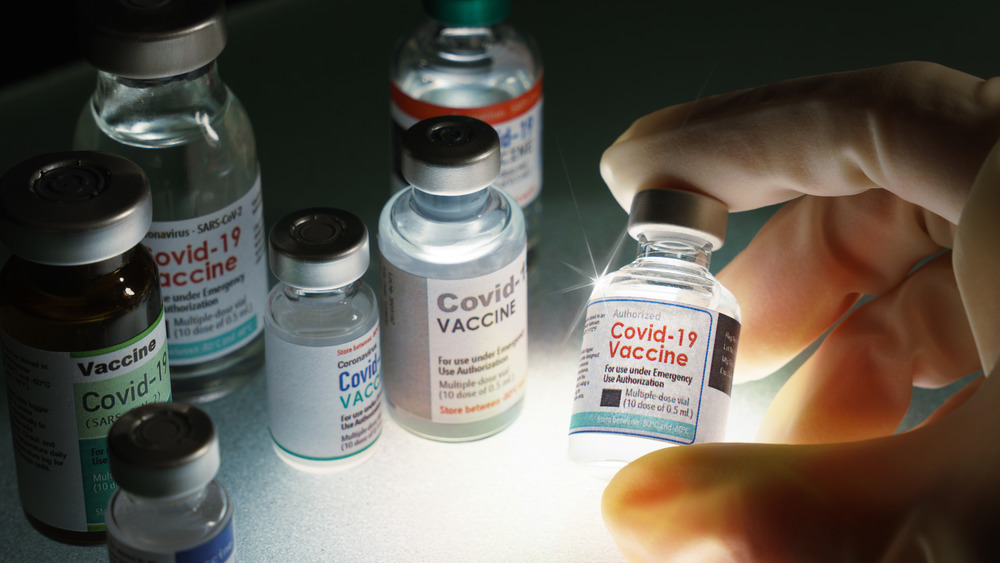Side Effects Of The Johnson & Johnson COVID-19 Vaccine Explained
In late February, the Food and Drug Administration issued an emergency use authorization for the third COVID-19 vaccine in the United States. According to a press release from Johnson & Johnson, clinical trials found their vaccine to be 85 percent effective in preventing severe disease from coronavirus among people who were vaccinated.
The thing that makes the Johnson & Johnson version, also called the Janssen vaccine, so different is that it is a one-shot inoculation, whereas both Pfizer and Moderna's vaccines require two doses. That's a good thing for consumers, because it limits the amount of time you might have to experience side effects, which can be unpleasant — but generally aren't harmful, according to the Centers for Disease Control.
The Janssen vaccine also solves a problem that has been experienced with the other vaccine versions since the start: shipping and storage. Both Pfizer and Moderna's vaccines require extremely cold temperatures throughout the supply chain, a requirement that has been difficult for some states and municipalities to meet. Johnson & Johnson's shot does not require this cold storage, according to Stat News, so it is easier to transport and store.
Side effects for the Johnson & Johnson vaccine should be mild
Side effects for the Janssen vaccine are similar to those that people have been experiencing with the other versions. After the shot, a person might have some pain, redness, or swelling at the injection site, or feel fatigue, headache, muscle aches, chills, fever, or nausea. The side effects generally begin within the first two days after getting the vaccine, and only last a day or two. Rarely, people have reported side effects lasting up to seven days.
The side effects are an indicator that your body is responding to the vaccine and building immunity to COVID-19. Johnson & Johnson used research they developed in creating their Ebola vaccine to create what's called a viral vectored vaccine. The inoculation introduces an adenovirus that has been genetically modified to carry the code for the SARS-2 spike protein. The body recognizes this modification once it enters a cell and uses it to create more spike proteins, which trigger your body to produce antibodies that fight coronavirus.
Fewer side effects for Johnson & Johnson than other vaccines
In clinical trials, about half of the people who received the Johnson & Johnson vaccine experienced localized pain, redness, or swelling at the site of the shot, according to Healthline. Most people saw side effects within the first two days after the injection and experienced them for two to three days. Only three percent of people experienced side effects for more than seven days.
Fifty-five percent of people experienced flu-like side effects, which also began, on average, two days after the shot. Fatigue, muscle aches, and headache lasted an average of two days with nausea and fever running their course in a single day for most people.
Most side effects were reported by people between the ages of 18 and 59. The incidence of side effects decreased after age 60. Overall, fewer people are experiencing side effects after Johnson & Johnson's vaccine than with either Pfizer or Moderna.
What you can do to treat side effects
If side effects are uncomfortable, there are a few things you can do. It is important that you do not take a pain reliever in advance of your vaccination as that may cause your body to suppress its immune response, according to WebMD. After the vaccination, it's fine to take a pain reliever like Advil, Motrin, or Tylenol to deal with aches and pains.
If you develop a fever, however, try to handle that with therapeutic care like drinking plenty of fluids and dressing lightly. Dr. Paul Offut, director of the Vaccine Education Center and Children's Hospital of Philadelphia, told WebMD it's best to let fevers run their course. "My general belief on this is it's never a good idea to blunt fever, because fever is an adaptive part of your immune response. Let your immune system do its job," he said.
Remember to rest while your body is responding to the vaccine and building an immune response. Now is the time to be kind to yourself.
Severe allergic reaction is rare
When you go to get the vaccine, it's likely you may be asked to fill out paperwork that will contain a question asking if you've ever had an allergic reaction to a vaccination. Johnson & Johnson includes the warning in their press release about the Janssen vaccine that there is a remote chance that it could cause an allergic reaction in some people. This type of reaction is most likely to occur within a few minutes to an hour after getting the vaccine, so most vaccination sites ask you to wait for at least 15 minutes after your shot for observation. If you've ever had an adverse reaction to a vaccination, they'll likely ask you to wait for 30 minutes for observation, according to the University of Maryland Medical System.
Indications of an allergic reaction would include symptoms like trouble breathing, swelling of the face or throat, increased heart rate, an all-over body rash, weakness, and dizziness. If you have had a reaction to a vaccination in the past, the CDC advises that you speak to your doctor before getting the COVID-19 vaccine to discuss the risks vs. benefits.
You can report any severe side effects to authorities
If you get the Johnson & Johnson vaccine and experience any side effects which have you concerned, the CDC recommends calling your doctor. Things to watch for would be redness or tenderness at the shot site that gets worse after 24 hours, or any systemic symptoms that don't clear up after several days.
The Johnson & Johnson vaccine is recommended for anyone who is not allergic to any ingredient contained within the vaccine. According to the FDA, the ingredient list includes: recombinant, replication-incompetent adenovirus type 26 expressing the SARS-CoV-2 spike protein, citric acid monohydrate, trisodium citrate dihydrate, ethanol, 2-hydroxypropyl-β-cyclodextrin (HBCD), polysorbate-80, and sodium chloride.
If, after receiving the Janssen vaccine, you do experience side effects that are concerning, the CDC and Johnson & Johnson request that you report them to the FDA/CDC Vaccine Adverse Event Reporting System (VAERS). You can call the system at 1-800-822-7967, or visit the VAERS website. You should include "Janssen COVID-19 Vaccine EUA" in the first line of box #18 on the report form.
You can also report adverse side effects to Janssen Biotech by calling 1-800-565-4008, or emailing JNJvaccineAE@its.jnj.com.






